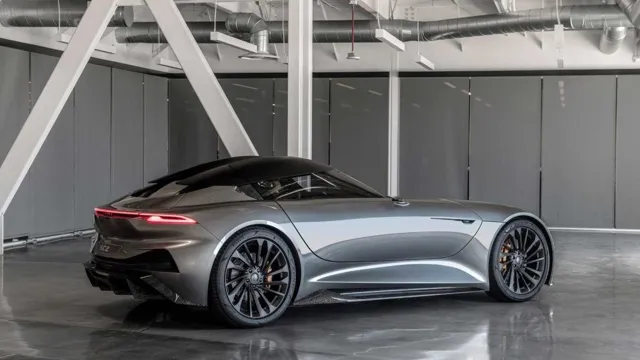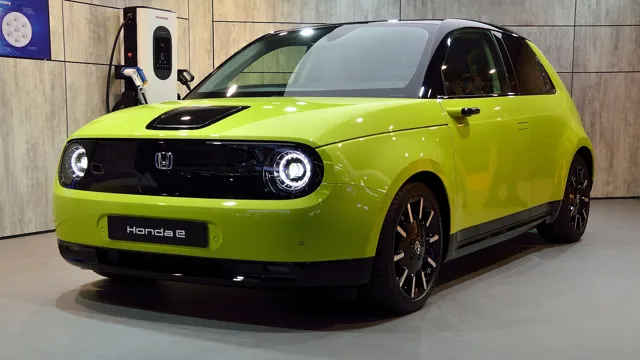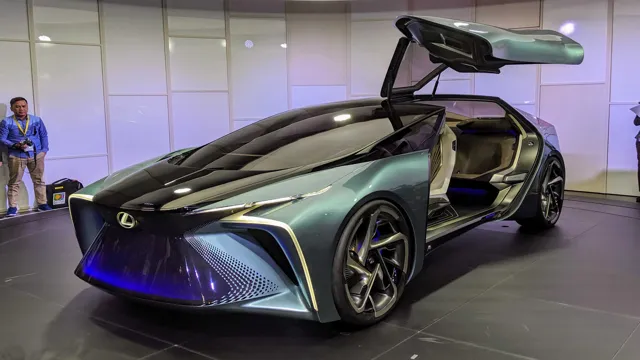Revving Towards a Sustainable Future: Top Electric Cars in the Latest US News
If you’re keeping up with the latest trends in the automotive industry, you know that electric cars are gaining popularity and making waves on the road. With more and more car manufacturers entering the market, there’s news flying around all the time. That’s why we’re here to keep you up to date with the latest happenings in the world of electric cars.
Whether you’re a curious consumer or just a tech enthusiast, it’s important to stay informed about the latest advancements, from new models to cutting-edge developments in battery technology. So buckle up and get ready to dive into the exciting world of electric cars.
Top Electric Car Models in the US
When it comes to electric cars, the options available in the US market have grown significantly over recent years. As the push for sustainable transportation continues, many top automakers have developed their own electric cars to meet the demand. One of the most popular electric cars in the US is the Tesla Model 3, with its sleek design and impressive range of up to 263 miles.
Another top contender is the Chevrolet Bolt EV, which boasts a range of up to 259 miles and comes in at a more affordable price point than many other options. For those who prioritize luxury, the Audi e-Tron is a top pick with its sophisticated interior and impressive driving performance. Overall, electric cars have proven to be a viable and exciting option for US drivers, offering sustainable and efficient transportation that is both powerful and efficient.
So, if you’re in the market for a new car, considering an electric option could be a smart and eco-friendly choice.
Tesla Model S
The Tesla Model S is one of the top electric car models in the US, and it’s not hard to see why. This sleek and stylish vehicle boasts a range of up to 402 miles per charge, which is impressive by any standard. Not only is the Model S powerful, with up to 1,020 horsepower in the Plaid variant, it’s also packed with high-tech features like a massive touchscreen display, advanced autopilot capabilities, and over-the-air software updates.
Perhaps most importantly, the Model S has helped to shift the public perception of electric cars from eco-friendly novelties to high-performance machines that can stand toe-to-toe with their gas-guzzling counterparts. Whether you’re looking for a way to reduce your carbon footprint or simply want the thrill of driving one of the fastest cars on the road, the Model S is an excellent choice.

Chevrolet Bolt EV
The Chevrolet Bolt EV is one of the top electric car models in the US, and for good reason. It boasts an impressive range of up to 259 miles on a single charge, making it a viable option for daily commuting as well as longer road trips. Additionally, its sleek design and comfortable interior make for an enjoyable driving experience.
One unique feature of the Bolt is its one-pedal driving mode, which allows drivers to accelerate and decelerate using only one pedal. This not only saves on energy, but also makes for a more intuitive and efficient driving experience. Overall, the Chevrolet Bolt EV is a reliable and practical choice for anyone looking to make the switch to electric.
Ford Mustang Mach-E
The Ford Mustang Mach-E has taken the electric car market by storm. This sleek and powerful vehicle combines the classic Mustang design with cutting-edge electric technology to create a truly unique driving experience. The Mach-E offers impressive performance with a range of up to 300 miles on a single charge and fast charging capabilities at over 500 charging stations across the US.
The interior boasts a spacious and modern design with a large touchscreen display and voice-activated controls. Overall, the Mustang Mach-E is a top contender in the electric car market and is sure to turn heads on the road. So, are you ready to join the electric movement and experience the power of the Mach-E for yourself?
US Government Incentives for Electric Cars
If you’re considering buying an electric car, you might be interested in the various incentives offered by the US government to promote clean energy. One of the most well-known incentives is the federal tax credit, which can provide up to $7,500 for qualifying vehicles. However, it’s important to note that the credit is gradually phased out for manufacturers who have sold over 200,000 qualifying vehicles.
Additionally, many states offer their own incentives such as rebates, tax credits, and exemptions from sales tax or emissions testing. These incentives vary by state, so be sure to do your research before making a purchase. By taking advantage of these incentives, you could potentially save thousands of dollars on your new electric vehicle.
Not only will you be making a positive impact on the environment, but you’ll also be saving money in the long run on fuel and maintenance costs.
Federal Tax Credit
If you’re considering purchasing an electric vehicle, you may be eligible for a federal tax credit from the US government. This credit is designed to incentivize the use of environmentally-friendly cars and reduce carbon emissions. The amount of the credit you can receive depends on the make and model of the electric vehicle you choose.
For example, the credit for a Tesla Model S ranges from $1,875 to $7,500, while a Chevrolet Bolt can qualify for the full $7,500 credit. It’s important to note that this credit is only available to those who purchase new electric vehicles and may not be available forever. However, taking advantage of this credit can significantly reduce the cost of ownership for an EV, making it a smart and cost-effective choice for environmentally-conscious drivers.
State-Specific Rebates
Electric cars are a great way to reduce your carbon footprint and save on fuel costs. Fortunately, the US government offers many incentives for people who choose to make the switch to electric vehicles. One of the most popular incentives is state-specific rebates.
These rebates vary from state to state but can help you save thousands of dollars on your new electric car. Some states offer thousands of dollars in rebates, while others offer tax credits or other incentives. To find out what incentives are available in your state, you can visit the website of your state’s Department of Energy or speak to a local electric car dealer.
In addition to state-specific rebates, there are also federal tax credits available for electric cars. These credits can range from a few thousand dollars up to $7,500, depending on the make and model of your vehicle. With all of these incentives available, there has never been a better time to make the switch to electric cars.
So, what are you waiting for? Start exploring your options today and see how much you can save on your new electric car.
Charging Infrastructure in the US
When it comes to electric cars, the US has seen a significant increase in demand. However, one of the biggest concerns for electric car owners is the availability of charging infrastructure. Fortunately, the US has been rapidly expanding its charging network to meet this demand.
As of 2021, there are over 100,000 public charging stations and over 400,000 charging outlets available for use across the country. This has made owning an electric car far more practical for Americans who are looking to move away from gasoline-powered vehicles. While there is still room for improvement in terms of charging speed and accessibility, the US has made significant progress in creating a robust charging infrastructure that is reliable and accessible to all electric car owners.
With more and more automakers committing to producing electric vehicles, the demand for additional charging stations is sure to continue to rise in the coming years.
Number of Charging Stations by State
The number of charging stations by state is an important factor to consider when assessing the development of charging infrastructure in the US. It’s no secret that electric vehicles are becoming increasingly popular, but to truly facilitate their widespread adoption, they need access to convenient and reliable charging solutions. Luckily, many states across the country are taking steps to improve their charging infrastructure, with California, Texas, and Florida having the highest number of public charging stations.
However, there is still a long way to go. Some states, particularly those in the Midwest, have exceedingly few charging stations, making EV travel difficult or downright impossible. By investing in charging infrastructure, states can not only support their own residents but also contribute to the growth of the electric vehicle industry as a whole.
Top Charging Station Providers
Charging infrastructure in the US has come a long way in recent years, with a noticeable increase in the number of electric vehicles hitting the road. To cater to this growing demand, many charging station providers have emerged, making it easier for EV owners to charge their vehicles. Some of the most popular charging station providers in the US include ChargePoint, EVgo, and Electrify America.
ChargePoint is one of the largest charging station providers and offers a user-friendly app that helps locate nearby charging stations and make payments. EVgo has an extensive network of fast-charging stations located strategically along major highways and in urban areas. Electrify America, on the other hand, offers ultra-fast charging capabilities and has partnered with major car manufacturers to provide charging stations at select dealerships.
With more players entering the market, and state and federal incentives to promote EV adoption, the charging infrastructure in the US is set to experience exponential growth.
Electric Cars vs Gasoline Cars – Cost Comparison
Electric cars have taken the world by storm and are being touted as the future of transportation. But when it comes to owning one, one question looms large: is it cheaper than a gasoline car in the long run? The answer is a resounding yes. While purchasing an electric car may initially cost more than a traditional gasoline car, the cost of ownership over the lifetime of the vehicle is significantly lower.
This is partly due to the fact that electric cars require less maintenance and are more efficient than gasoline cars. The US News electric cars report highlights another key factor in cost savings: fuel. Owning an electric car can save owners up to $1,000 a year on fuel costs alone.
With these benefits, it’s clear why electric cars are a wise investment for both the environment and our wallets.
Conclusion
In conclusion, it’s clear that the electric car revolution is not just a passing trend, but a transformative shift in the automotive industry. The increasing affordability and availability of electric vehicles, combined with growing concerns about climate change and air pollution, make it more important than ever to consider going electric. Not only is it a smart and responsible choice for the planet, but electric cars are also more fun to drive and require less maintenance.
So why not make the switch and join the electric car movement? Trust us, you won’t regret it – and you might even be the envy of your gas-guzzling neighbors.”
FAQs
How has the demand for electric cars in the US changed in recent years?
There has been a significant increase in the demand for electric cars in the US in recent years, driven by factors such as environmental concerns, rising fuel prices, and government incentives.
What are some of the most popular electric cars in the US?
Some of the most popular electric cars in the US include the Tesla Model S, Nissan Leaf, Chevrolet Bolt, and the BMW i3.
What are the benefits of owning an electric car in the US?
There are several benefits to owning an electric car in the US, including lower fuel costs, reduced carbon emissions, and access to carpool lanes and other incentives in some states.
How do electric cars compare to traditional gas-powered cars in terms of performance?
Electric cars generally have faster acceleration and smoother handling than gas-powered cars, and produce less noise and vibration. However, their driving range and speed may be limited compared to traditional cars.





